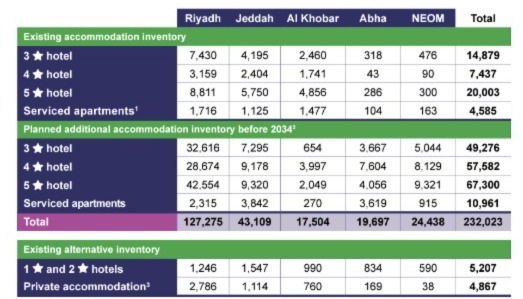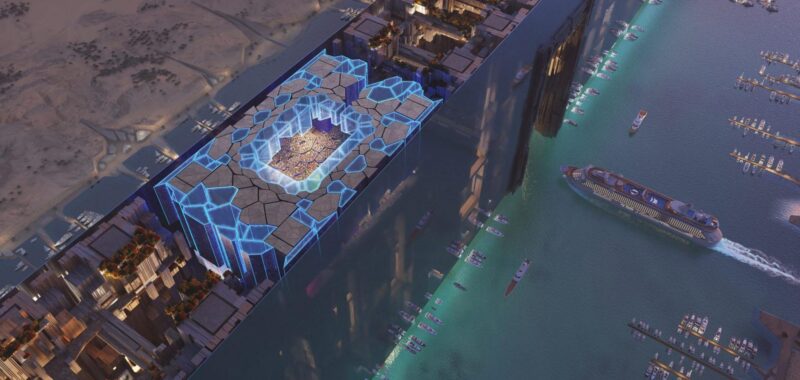Saudi Arabia has submitted its bid to host the men’s football World Cup in 2034, and for the first time has laid out goals for development of hotels, stadiums, and other parts of its travel economy.
Saudi’s 245-page “bid book” calls for tens of thousands of additional hotel rooms, 11 new stadiums, and cities built from the ground up.
For now, these are ambitious goals, and a lot of work and investment will be required to deliver on them. Projects that were part of crown prince Mohammed bin Salman’s 2030 Vision have not had clear timelines and there have been reports of delays.
Saudi proposes that it would host the event across Riyadh, Neom, Jeddah, Al Khobar and Abha. The opening match and the final would take place in Riyadh.
FIFA also has new rules around human rights and worker safety, related to the construction of stadiums, hotels, and airports. These grew out of the 2022 World Cup in Qatar, where migrant workers died due to unsafe working conditions. Saudi’s bid book devotes 15 pages to sustainability and human rights.
The bid book does not mention alcohol, which is banned in Saudi Arabia.
Here are some of the biggest promises Saudi Arabia is making:
Hotels, Hotels and More Hotels
The bid book reveals how many hotels Saudi Arabia is building, when they are opening, and how many are luxury. Saudi says it already has “over 45,000 hotel rooms in alignment with FIFA requirements across the host cities,” with more than 185,000 additional rooms” opening by 2034.
Here is the breakdown in star ratings:


One table gives insight into how Saudi’s hotel market could look in a decade, including an upcoming boom in four-star hotel development. For example, Neom is planning over 9,000 five-star hotel rooms, 8,000 four-star and 5,000 three-star.
The document also reveals planned opening dates: For example, a “luxury Fifa venue hotel” at Neom is slated for completion in 2032. A separate “ultra-luxury” hotel at The Line â Neom’s proposed 170-kilometer-long indoor city, is also meant to open in 2032.
“A big risk for adding such a big supply of rooms for a major event like the World Cup or the Olympics is what happens afterward,” said Alan Woinski, editor of the Skift publication, Daily Lodging Report. “There have been instances of the rooms sitting empty, forcing owners to convert to apartments or mixed-use eventually.”
Neom’s Timeline
The Saudis say the developments “first district” will be ready before 2034. It states: “All FIFA World Cup 2034 activities in Neom will take place in the first district of The Line, which will be fully operational in advance of the Competition.”
“On arrival near the event sites, passengers will be able to travel quickly to their destinations by short walks or high-speed shuttles. A wide range of accommodation will be available, from three-star to ultra-luxury hotels as well as fully furnished and serviced apartments.”
Air Connectivity
Saudi says that all five proposed host cities will have modern airports connecting over 250 international destinations. By 2030, Saudi Arabia will have a countrywide airport capacity of more than 300 million passengers and offer flights to 250 destinations.
Major hubs such as Riyadh, Jeddah and Neom each have lofty targets.
Riyadh: Saudi Arabia is planning to develop King Salman International Airport, which would become one of the worldâs largest airports before 2034. It will incorporate the existing terminals of King Khalid International Airport. The airport is expected to accommodate up to 100 million passengers per year before 2034, a 170% increase from 2023. Riyadh Air, a Saudi airline established in 2023, will have its main operational base in Riyadh and expects to reach 100 destinations around the world by 2030.
Jeddah: Situated approximately 20km north of Jeddah city center, King Abdulaziz International Airport is the largest in the country by passenger capacity and number of direct routes. A new terminal is planned as part of a wider expansion that would increase capacity to 90 million passengers before 2034.
Neom: The Neom International Airport, set to be located eastwards of The Line, will be Saudi Arabiaâs newest airport and the primary conduit for the World Cup. Before 2034, the airport will offer flights to 29 international and five domestic destinations and be able to accommodate 20 million passengers per year. Saudi expects demand to reach 12 million passengers per year before 2034.
When Would the World Cup Take Place?
Similar to the 2022 World Cup in Qatar, holding the event in winter may be necessary to ensure cooler temperatures in Saudi Arabia. From October to April, temperatures in host cities range from 59 to 86 degrees Fahrenheit, while from May to September, they can climb from 63 to 100 degrees Fahrenheit.
Stadiums, Capacity and Opening Dates
Riyadh
- King Salman International Stadium – 92,760 capacity, completed 2029
- King Fahad Sports City Stadium – 70,200, refurbished by 2026
- Prince Mohammed bin Salman Stadium – 46,979, completed by 2029
- New Murabba Stadium – 46,010, completed by 2032
- Roshn Stadium – 46,000, completed by 2032
- Prince Faisal bin Fahad Sports City Stadium – 46,865, completed by 2027
- South Riyadh Stadium – 47,060, completed by 2032
- King Saud University Stadium – 46,319, refurbished by 2032
Jeddah
- King Abdullah Sports City Stadium – 58,432, refurbished by 2032
- Qiddiya Coast Stadium – 46,096, completed by 2032
- Jeddah Central Development Stadium – 45,794, completed by 2027
- King Abdullah Economic City Stadium – 45,700, completed by 2032
Al Khobar
- Aramco Stadium – 46,096, completed by 2026
Abha
- King Khalid University Stadium – 45,428, refurbished by 2032
Neom
- Neom Stadium – 46,010, completed by 2032
The Importance of Sports
A flourishing sports economy is a principal focus for Saudi Arabia.
In a September interview with Fox News, M.B.S. said: âWhen you diversify an economy, you have to work in all sectors: Mining, infrastructure, manufacturing, transportation, logistics, all the list, and you need tourism. If you want to have tourism, you need to develop your culture sector, entertainment and sports. You need to create a calendar.â
âIf sports washing is going to increase our GDP, then weâll continue doing sports washing. I donât care. I have 1% GDP growth from sports, and I want another 1.5%, call it whatever you want, but weâre going to get that percentage.â
Saudi Arabia’s bid is the first and only one so far. But it’s not until December 11 that hosts are set to be confirmed by FIFA for the 2030 and 2034 World Cups. Saudi has invited FIFA to host its host draw at The Line.

